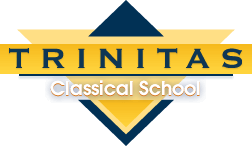Christian
Christian Worldview – Our school’s culture and teaching is based on “classical” Judeo-Christian faith and practice, the “positive, self-consistent, and inexhaustible” “mere Christianity” (C. S. Lewis) shared by Roman Catholic, Orthodox, and Protestant Christians. Students examine life and work from a Christian perspective, acknowledging that everything we know and do is hemmed in, behind, and before by the Holy Trinity: Father, Son, and Holy Spirit.
Financial Sustainability – As we endeavor to be faithful stewards of that which has been entrusted to us, Trinitas remains committed to beginning each school year with 90% of funding in place, covering operating costs with tuition, making approximately 10% of expected tuition revenue available for need-based scholarships, and maintaining prudent cash reserves.
Stewardship – Students learn that the earth is the Lord’s and everything in it. They are instructed to manage and use wisely all that God has entrusted to them — finances, raw materials, renewable resources, facilities, gifts, abilities, time, etc.
Liberty – Trinitas accepts no taxpayer funding either directly or indirectly. As a result, Trinitas maintains the independence necessary to develop curricular offerings that avoid the pitfalls of government initiatives in STEM, STEAM, and Common Core and to take advantage of professional development opportunities beyond those sanctioned by secular progressivism.
Classical
Classical Model – All curriculum is based on, but not entirely encompassed by, the educational model of the Trivium, an education in three ways, which originated with the Greeks and remained as the primary educational model throughout the modern age. This model of education uses classical and classic literature, classical languages, history, logic, mathematics, science, rhetoric, and the discussion of great ideas to encourage syntopic and critical thinking as well as a love of learning.
Well-roundedness – We teach to the whole student: body, soul, and mind. We strive to produce students who will have a breadth of knowledge about many academic subjects as well as experience in extra-curricular areas such as athletics, applied learning, clubs, and the arts. These experiences give them a more thorough knowledge of many aspects of arts and culture so that they become conversant about a variety of subjects. It also gives them a depth of appreciation for the gifts God has given to humankind.
Rigorous Comprehensive Curriculum – A broad range of subjects are taught, including math, science, language arts, history, foreign languages, Bible, logic, rhetoric, music, and literature. The curriculum exhibits a highly intentional structure running from Kindergarten through Grade 8. Each year builds naturally on what has come before without gaps or unnecessary repetition. Subjects are often integrated. Maintaining high academic and behavioral standards ensures the rigor of the classes.
Community
Community – The concept of community is a multi-faceted one that includes both the internal community of the Trinitas students, faculty, staff, and families and the external community of Grand Rapids at large. We are primarily dedicated to the nurture, education, and welfare of the children of the families of Trinitas. We also believe that we were created to live deeply with one another, to rejoice with and weep with one another, to pray for and confess our sins to each other, to suffer and celebrate together. It’s in these sacred relationships and honest, loving communities that God transforms us. Trinitas is dedicated to providing opportunities for community building within and outside of itself.
Small Class Size – We cap our classes at twenty full-time students while leaving the possibility of adding four additional homeschool partnership students. Smaller class sizes ensure greater intimacy, student accountability, and individualized attention for each child.
Servant Leadership – Students learn to be leaders in their sphere of influence by being taught to lead in both small and significant ways in the school and the broader community. Weekly classroom responsibilities and multi-age classrooms provide opportunities for students to learn to lead by serving others. Students are also encouraged to look for similar ways to serve in their homes, churches, and broader communities.
Diversity – Because the diversity of God’s creation teaches us about the depth and breadth of God’s love and creativity, we strive to have a student body that reflects the diversity of God’s creation by encouraging people from different walks of life who are dedicated to the pursuit of classical and Christian education to be a part of the Trinitas community. This includes people of different races, different socio-economic strata, and different Christian confessions.

